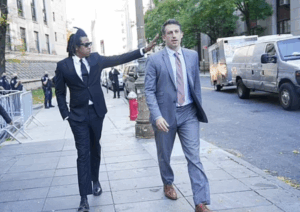**Harvey Weinstein has been found guilty of sexual assault in New York, adding to his prior legal woes and highlighting the challenges faced by sexual assault survivors.**
**Harvey Weinstein Convicted Again for Sexual Assault in New York Retrial**

**Harvey Weinstein Convicted Again for Sexual Assault in New York Retrial**
**The retrial verdict marks a critical moment in the ongoing battle against sexual violence by powerful figures.**
Harvey Weinstein has once again been found guilty of sexual assault following a retrial in New York, a significant development after his previous conviction was overturned last year. The mixed verdict comes from a jury composed of seven women and five men who deliberated for five days, arriving at a unanimous decision to convict Weinstein on one count of sexual assault, yet finding him not guilty on another charge and remaining undecided on a rape allegation.
This latest ruling stems from allegations made by three women: Miriam Haley, a former television production assistant, actress Jessica Mann, and model Kaja Sokola, all of whom accused Weinstein of exploiting his position in the entertainment industry to carry out various forms of sexual violence. The jury's conviction against Weinstein pertains specifically to Haley's assault claim, while Sokola's accusation resulted in a not guilty outcome. The jury has deferred its verdict on Mann’s rape allegations, with deliberations set to continue on Thursday.
Haley expressed hope that the verdict would enhance awareness of sexual violence issues and challenge societal myths regarding victimhood. This conviction adds to Weinstein's troubled legal history, as he is already serving a 16-year sentence following an earlier conviction for sex crimes in California.
The previous conviction of Weinstein was annulled by an appeals court last April due to procedural issues during the trial—specifically, the inclusion of testimony from individuals with separate allegations against him. Subsequently, Weinstein faced new charges in New York in September 2022.
Throughout the retrial, tensions among jurors were high, with reports of heated disputes and accusations of bias during deliberations. Weinstein's legal representatives have claimed that the environment in the jury room was compromised by preconceived notions regarding Weinstein’s past, which they argue influenced the decision-making process. The defense has flagged potential appeals based on these concerns.
Witness testimony from the three women endured several days, each recounting experiences of being coerced into sexual situations by Weinstein, who exploited his power when they sought career opportunities in the film industry. The defense attempted to undermine their credibility by presenting prior communications with Weinstein that contradicted their allegations of non-consensual encounters.
With more than 100 individual accusations against Weinstein spanning several years, his legal troubles reflect broader societal conversations around sexual misconduct and the #MeToo movement. The response to his accusations sparked significant activism surrounding systemic abuse by influential men in various industries, fundamentally altering dialogues around power dynamics and accountability in Hollywood.
As Weinstein faces an uncertain future amid continued legal scrutiny and potential civil damages, his actions and the public reaction to them remain a focal point in the fight for justice and change regarding sexual abuse in society.
This latest ruling stems from allegations made by three women: Miriam Haley, a former television production assistant, actress Jessica Mann, and model Kaja Sokola, all of whom accused Weinstein of exploiting his position in the entertainment industry to carry out various forms of sexual violence. The jury's conviction against Weinstein pertains specifically to Haley's assault claim, while Sokola's accusation resulted in a not guilty outcome. The jury has deferred its verdict on Mann’s rape allegations, with deliberations set to continue on Thursday.
Haley expressed hope that the verdict would enhance awareness of sexual violence issues and challenge societal myths regarding victimhood. This conviction adds to Weinstein's troubled legal history, as he is already serving a 16-year sentence following an earlier conviction for sex crimes in California.
The previous conviction of Weinstein was annulled by an appeals court last April due to procedural issues during the trial—specifically, the inclusion of testimony from individuals with separate allegations against him. Subsequently, Weinstein faced new charges in New York in September 2022.
Throughout the retrial, tensions among jurors were high, with reports of heated disputes and accusations of bias during deliberations. Weinstein's legal representatives have claimed that the environment in the jury room was compromised by preconceived notions regarding Weinstein’s past, which they argue influenced the decision-making process. The defense has flagged potential appeals based on these concerns.
Witness testimony from the three women endured several days, each recounting experiences of being coerced into sexual situations by Weinstein, who exploited his power when they sought career opportunities in the film industry. The defense attempted to undermine their credibility by presenting prior communications with Weinstein that contradicted their allegations of non-consensual encounters.
With more than 100 individual accusations against Weinstein spanning several years, his legal troubles reflect broader societal conversations around sexual misconduct and the #MeToo movement. The response to his accusations sparked significant activism surrounding systemic abuse by influential men in various industries, fundamentally altering dialogues around power dynamics and accountability in Hollywood.
As Weinstein faces an uncertain future amid continued legal scrutiny and potential civil damages, his actions and the public reaction to them remain a focal point in the fight for justice and change regarding sexual abuse in society.






















